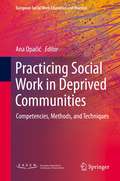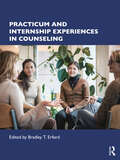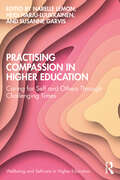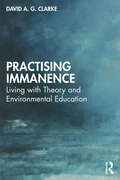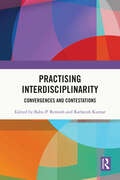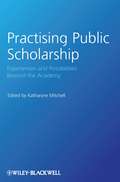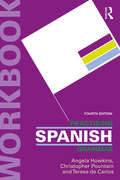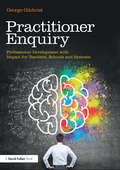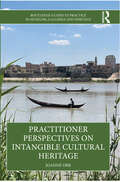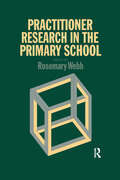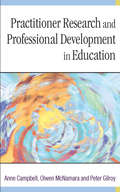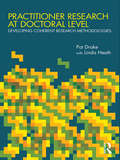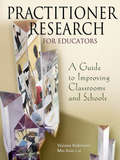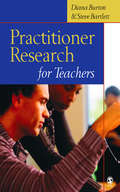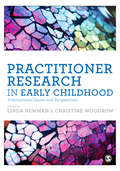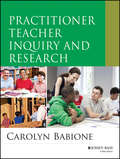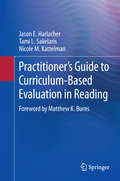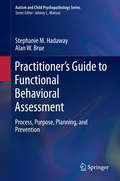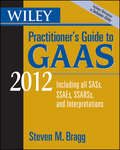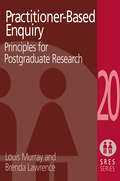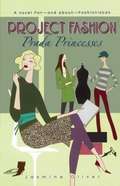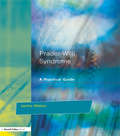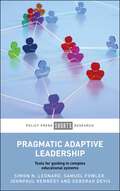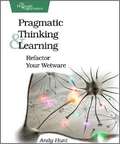- Table View
- List View
Practicing Social Work in Deprived Communities: Competencies, Methods, and Techniques (European Social Work Education and Practice)
by Ana OpačićThis contributed volume offers a holistic understanding of social work practice in deprived communities through its thematization of understanding deprived communities globally, the development of competencies for social work practice in and with deprived communities, social work education as a community development tool, and the empowerment of social workers in deprived communities. Inequality as a globally recognized challenge is extensively elaborated within the UN Sustainable Development Goals (SDGs) and the Global Agenda program for social work, making this a timely and important contribution to the literature. Deprived communities, used in this book to mean slums, ghettos, favelas, and low-income, remote, underserved, vulnerable, impoverished, underdeveloped, disadvantaged, or less-favoured communities, exist worldwide and are conceptualized under different terms and concepts. For that reason, social work, specifically in deprived areas, is not sufficiently recognized as a specific field of practice within community work. As a result, this volume features contributions that:provide a conceptual clarification of many different terms that are used for describing deprived communities and offer a systematic literature review on community processes and effects on well-being in underdeveloped communities;map different fields of social work involvement in deprived communities with concrete practice examples; and,stress why social work as a profession needs support and how it can be empowered to improve its capacities in deprived communities. With international authorship and perspectives on social work approaches for deprived communities from India, Sub-Saharan Africa, North and Central Europe, and North America, Practicing Social Work in Deprived Communities is an essential resource for social workers, social work educators, and community development practitioners. The text also should be of interest to students of social work, as well as other professionals and researchers working within community development and deprived communities.
Practicum and Internship Experiences in Counseling
by Bradley T. ErfordThis ready-to-use resource provides the practical information and hands-on skills interns and practicum students need to successfully complete their clinical experiences and join the counseling profession with confidence. Designed to accompany students as they advance through practicum and internship, Practicum and Internship Experiences in Counseling helps bridge the gap from theory to practice. It covers the day-to-day elements of practice in agencies and schools that are often missing from the theory-based courses. Chapters are packed with case examples, activities, voices from the field, and self-assessments, including tools for assessing and addressing ethnocentrism, intersectionality, and bias in counseling practice. This resource orients clinical students to the field, while providing them with the day-to-day skills they need to thrive. Special focus on: Expectations and how to get the most out of the supervision process Assessment and intervention with clients in danger and crisis Wellness and developing healthy work and personal habits to carry through one’s entire career. Readers see clearly how to: Apply the laws and ethics in everyday clinical practice Work with special issues (neuropsych and psychopharmacology) and populations Market and position oneself in the job market, with an eye toward growing/marketing a counseling practice after graduation Included in each chapter: Several self-assessment activities encouraging self-reflection and self-assessment on the concepts of the chapter Voices from the field features providing firsthand, in-the-trenches perspectives from counselors who have "been there and done that." Realistic case examples challenging readers to apply knowledge and skills to realistic cases they are likely to encounter in the field Included are separate chapters on: Relationship building Goal setting Record keeping The integration of theory into practice
Practising Compassion in Higher Education: Caring for Self and Others Through Challenging Times (Wellbeing and Self-care in Higher Education)
by Susanne Garvis Narelle Lemon Heidi Harju-LuukkainenPresenting a collective international story, this book demonstrates the importance of compassion as an act of self-care in the face of change and disruption, providing guidance on how to cope under trying conditions in higher education settings. Practising Compassion in Higher Education presents an opportunity to learn through story and by taking proactive action for our wellbeing. It highlights the need to protect and maintain the wellbeing of staff and students, positioning the COVID-19 pandemic as a major catalyst of disruption. The chapters connect theory with lived experience, exploring self-compassion in work and research, compassion in teaching practice and within the personal/professional blur. The book’s contributors bring a range of theoretical and personal perspectives from various global contexts, sharing their own approaches to self-care and how compassion has become a central and crucial element of this practice. This book takes a unique approach to navigating and surviving the higher education environment and offers valuable lessons for the pandemic era and beyond. This will be an essential resource for students and professionals working in all areas of higher education.
Practising Immanence: Living with Theory and Environmental Education
by David A. ClarkePractising Immanence: Living with Theory and Environmental Education makes creative contributions to both qualitative inquiry and environmental education by exploring how each of these ideas seep and fuse into one another, creating a space where methodology becomes pedagogy, and where each of these is already always environmental: indivisible with life. Clarke’s energising and innovative approach offers a challenge to conventional research practices and shows ways in which inquiry can be done differently. Drawing on new materialisms, affect theory and the practical philosophy of Gilles Deleuze and Felix Guattari, the book details the PhD journey of the author, merging stories and theory (and stories of theory) in the production of eight ‘haecceities’ – a philosophical concept which prioritises the thisness of a thing or event. This move allows a novel methodological approach whereby the haecceities act as sites of variation on the events of the book: the self as unstable and posthuman; the environment as everything (immanent) rather than as an overly romantic or a green version of nature; and the tensions that these moves create for ethical orientations in education, inquiry and life in the Anthropocene. Practising Immanence brings theory to life through a diffractively critical style and a unique approach to environmental pedagogic practice. This radical and vitalising book will be of interest to those inspired to explore environmental problems and inquiry with each other and to those drawn to creative-relational, narrative, embodied and post-qualitative approaches to research.
Practising Interdisciplinarity: Convergences and Contestations
by Babu P. Remesh Ratheesh KumarThis book examines the epistemological, social and political dimensions of practising interdisciplinary approaches to enhance knowledge, pedagogy, and methodological aspects of research in the South Asian context. The volume sets the context by bringing together a range of ideas, questions and reflections on the concept of interdisciplinarity, the numerous waves of interdisciplinarity in contemporary history of knowledge, which were radically different from each other in their epistemological and political orientations. The book revisits the concept of interdisciplinarity and takes into cognizance the importance of the mutual shaping of knowledge and politics in our search for inclusive and sustainable future(s). The book offers a blend of both conceptual and institutional discourses on interdisciplinarity and the personal experiences of leading practitioners, bringing together critical engagements from different vantage points on practising it. It will be of interest to researchers, scholars and practitioners of social sciences and humanities disciplines as well as interdisciplinary fields such as educational studies, development studies, women’s studies, media studies, cultural studies, urban studies, labour studies, legal studies, public health, disability studies, global/international studies and performing arts. It will also be useful for policy planners, development practitioners, activists and social organizers working in related fields.
Practising Public Scholarship: Experiences and Possibilities Beyond the Academy (Antipode Book Series #40)
by Katharyne MitchellA cross-disciplinary collection of 20 essays describing the journey to public scholarship, exploring the pleasures and perils associated with breaching the town-gown divide. Includes contributions from departments of geography, comparative literature, sociology, communications, history, English, public health, and biology Discusses their efforts to reach beyond the academy and to make their ideas and research broadly accessible to a wider audience Opens the way for a new kind of democratic politics—one based on grounded concepts and meaningful social participation Includes deeply personal accounts about the journey to becoming a public scholar and to intervening politically in the world, while remaining within a university system Provides a broad prescription for social change, both within and outside the university
Practising Spanish Grammar (Practising Grammar Workbooks)
by Christopher Pountain Teresa De Carlos Angela HowkinsPractising Spanish Grammar can be used independently or as the ideal companion to the sixth edition of the widely acclaimed A New Reference Grammar of Modern Spanish (Butt, Benjamin and Moreira Rodríguez). Thoroughly updated, this fourth edition of the workbook features an improved organization which closely mirrors that of A New Reference Grammar of Modern Spanish, sixth edition. The selection of exercises has been fully revised and expanded with new exercises on a variety of topics including possessives, conditional, future and past tenses, and polite requests. Designed to stimulate and engage even the most grammar-shy students, this is an ideal resource for Spanish learners at CEFR Level B2–C1, ACFTL Intermediate-High to Advanced.
Practitioner Enquiry: Professional Development with Impact for Teachers, Schools and Systems
by George GilchristPractitioner Enquiry: Professional Development with Impact for Teachers, Schools and Systems offers an accessible, step-by-step guide to practitioner enquiry, describing what practitioner enquiry is, what its adoption in schools entails, and what research and experience says about its benefits and possible pitfalls. Written by an experienced Headteacher who has worked with many schools to support their own engagement with practitioner enquiry, and who has been using the approach himself for over eight years, the chapters examine all aspects of its theory, practice and engagement. The book includes a variety of case studies to explore the effect of practitioner enquiry across a range of settings, and to show how you can bring about deep, sustainable and embedded change that has positive impacts for all learners. Chapters cover: how you can create the conditions for succeeding with practitioner enquiry the process of enquiring into your practice the role of school leaders and teachers in successful enquiry processes the benefits you may expect from such enquiry case studies from a number of different contexts, showing enquiry in action examples of research posters produced by teachers involved in enquiry. Practitioner Enquiry serves as a much-needed injection of up-to-date research into the field, combining theory and practice in an engaging and comprehensive style. It will be key reading for teachers and school leaders in both primary and secondary sectors.
Practitioner Perspectives on Intangible Cultural Heritage (Routledge Guides to Practice in Museums, Galleries and Heritage)
by Joanne OrrPractitioner Perspectives on Intangible Cultural Heritage provides an accessible introduction to the Intangible Cultural Heritage field. Summarising the major changes that have taken place over the last two decades, the book explores ongoing debates and changes in thinking about best practice. Drawing on the author’s own experience of operationalising the UNESCO 2003 Convention for the Safeguarding of Intangible Cultural Heritage in a variety of contexts, Orr also incorporates international case studies from practitioners and provides valuable insights about best practices. Demonstrating that the top-down, state-driven hierarchy for the safeguarding of heritage is starting to shift to a model of shared ownership and values driven by communities and practitioners, the book shows that the notion of the ‘expert’ is also diversifying to include other forms of transmission of traditional knowledge. Orr argues that these different perspectives provide a platform to enrich understanding and knowledge and create a stronger basis for the safeguarding of heritage - both intangible and tangible. Exploring some of the policy developments that have laid the foundations for the future involvement of community and practitioners in the global discourse, the book also suggests how practitioners can expand networks and contribute to the global discourse. Practitioner Perspectives on Intangible Cultural Heritage will appeal to museum curators and other heritage professionals, as well as students and academics engaged in the study of museums and heritage, art, and cultural policy and management.
Practitioner Research In The Primary School
by Rosemary WebbFirst Published in 1990. Routledge is an imprint of Taylor & Francis, an informa company.
Practitioner Research and Professional Development in Education
by Anne Campbell Olwen Mcnamara Peter GilroyDrawing directly on the work of teachers and other professional trainers concerned with programmes for continuing professional development, this book promotes action research for practitioners so as to develop qualities of critical appraisal and analysis of practice, appropriate to professional contexts. The authors suggest activities and give support for teaching, and evaluation of teaching, by using actual examples of teacher research into professional issues. They also aim to encourage teachers' narrative writing and autobiographical approaches to researching their professional lives. There is a specific focus on processes of professional development, which connects with current needs, demands and challenges of the `modernized' profession. This book will support those involved in appraisal activity, performance management and threshold application. This book is for schoolteachers and others involved with professional training across all age phases, and for those who support teachers' professional development: university tutors, consultants and senior staff in LEAs. It is also suitable for police and nurse trainers, further education tutors and advisory teachers.
Practitioner Research at Doctoral Level: Developing Coherent Research Methodologies
by Pat Drake Linda HeathIn trying to juggle the various priorities of doctoral study, many individuals struggle. From gathering data, preparing papers and organising projects, to the less obvious difficulties of time management and personal development, doctoral researchers are heavily tasked. In addition to this, those undertaking practitioner research face the complication of negotiating a less traditional research setting. As a guide to this ongoing, often neglected aspect of doctoral research, the authors of this innovative book explore in detail the challenges faced by doctoral researchers conducting practitioner research today. They show that the special nature of this research and the conditions in which the professional researcher works raise questions about producing new knowledge at work through research. This affects everything: relationships with practice; ethics; the ways that they are taught and supervised; the genre of the thesis; all place practitioners in situations which may not methodologically align with conventional approaches. In this book the authors take the opportunity to explore these themes in an holistic and integrated way in order to develop a sense of methodological coherence for the practitioner researcher at doctoral level. In doing so, the authors argue for what is possible, suggesting that universities should critically examine practitioner doctorates to accommodate new forms of knowledge formation. As an invaluable guide through doctoral research, this book will be essential reading for both doctoral researchers and supervisors alike, as well as practitioner researchers working in professional settings more generally and those engaging in policy debates about doctoral research.
Practitioner Research for Educators: A Guide to Improving Classrooms and Schools
by Mei Kuin Lai Viviane M RobinsonAppropriate for novice and experienced educators alike, this indispensable book explains how practitioner research can be used to solve instructional problems and improve student achievement.
Practitioner Research for Teachers (1-off Ser.)
by Steve Bartlett Diana M. Burton`This is a really useful book. It is full of helpful ideas and examples and discusses the importance of research for teachers. While addressing both the why and the how of practitioner research in school settings the authors have kept closely in touch with the practical concerns of busy professionals' - Professor Anne Edwards, School of Education, University of Birmingham This is a book about how to do your research. It's aimed at teachers involved in classroom-based research projects such as Best Practice Research Scholarships and Networked Learning Communities. This book is a significant text for teachers involved in practitioner research. It will discuss how the notion of classroom research has evolved from previous movements based upon school effectiveness and action research. It will show how being able to conduct and understand research is vital for the professional development of teachers. The text will then consider the practical issues of the design and carrying out of classroom-based research. The book contains practical examples to illustrate points where appropriate. Each chapter includes recommended further reading and practical tasks.
Practitioner Research in Early Childhood: International Issues and Perspectives
by Linda Newman Christine Woodrow"This comprehensive publication rightly establishes early childhood as a critical phase in the education of young people and makes the case for developing our insights regarding early childhood education (ECE) practices through the eyes of practitioner inquiry in the context of collaborative partnerships. It achieves its goal through a series of insightful case studies that not only illuminate the text as stories from the field, but also contribute to our understanding regarding ECE learning and pedagogy."- Susan Groundwater-Smith, Honorary Professor, Faculty of Education and Social Work, University of Sydney. Bringing together theory and practice, this book draws on the projects and experiences of senior and new researchers implementing various forms of practitioner research. Chapter discussions are informed by international literature to provide insightful reflections on research processes and the contribution of practitioner research in changing practice. The diversity of perspectives across the chapters provides an excellent resource for those undertaking research within early childhood contexts. Features include: the contribution of practitioner research to curriculum and social change. professional development and strengthening learning communities how practitioners can be supported in documenting and articulating their work the relationships between the research community and field of practice through practitioner research projects contemporary problems and issues that frame the practices of early childhood educators case studies from Australia, South Africa, Sweden and Chile A diverse range of case studies that use a range of internationally recognised research methods are presented. The book offers guidance, support and inspiration to practitioners on how to research their implementation of meaningful and sustainable changes in early childhood contexts.
Practitioner Research in Early Childhood: International Issues and Perspectives
by Linda Newman Christine Woodrow"This comprehensive publication rightly establishes early childhood as a critical phase in the education of young people and makes the case for developing our insights regarding early childhood education (ECE) practices through the eyes of practitioner inquiry in the context of collaborative partnerships. It achieves its goal through a series of insightful case studies that not only illuminate the text as stories from the field, but also contribute to our understanding regarding ECE learning and pedagogy."- Susan Groundwater-Smith, Honorary Professor, Faculty of Education and Social Work, University of Sydney. Bringing together theory and practice, this book draws on the projects and experiences of senior and new researchers implementing various forms of practitioner research. Chapter discussions are informed by international literature to provide insightful reflections on research processes and the contribution of practitioner research in changing practice. The diversity of perspectives across the chapters provides an excellent resource for those undertaking research within early childhood contexts. Features include: the contribution of practitioner research to curriculum and social change. professional development and strengthening learning communities how practitioners can be supported in documenting and articulating their work the relationships between the research community and field of practice through practitioner research projects contemporary problems and issues that frame the practices of early childhood educators case studies from Australia, South Africa, Sweden and Chile A diverse range of case studies that use a range of internationally recognised research methods are presented. The book offers guidance, support and inspiration to practitioners on how to research their implementation of meaningful and sustainable changes in early childhood contexts.
Practitioner Teacher Inquiry and Research (Research Methods for the Social Sciences)
by Carolyn A. BabioneTeacher inquiry helps improve educational outcomes Practitioner Teacher Inquiry and Research explores the concept and importance of the teacher practitioner, and prepares students in teacher education courses and programs to conduct research in the classroom. Author Carolyn Babione has extensive experience in undergraduate- and graduate-level teacher training and teacher inquiry coursework. In the book, Babione guides students through the background, theory, and strategy required to successfully conduct classroom research. The first part of the book tackles the "how-to" and "why" of teacher inquiry, while the second part provides students with real-life practitioner inquiry research projects across a range of school settings, content areas, and teaching strategies. The book's discussion includes topics such as: Underlying cultural and historical perspectives surrounding the teaching profession Hidden stereotypes that limit teacher beliefs about power and voice Current curriculum innovation and reflections on modern developments Practitioner Teacher Inquiry and Research successfully guides and encourages budding teachers to fully understand the importance of their involvement in studying and researching their classroom settings, giving a better understanding of how their beliefs and teaching practices impact classroom learning.
Practitioner's Guide to Curriculum-Based Evaluation in Reading
by Jason E. Harlacher Tami L. Sakelaris Nicole M. KattelmanThe educators are dedicated and concerned. The curriculum is successful. Yet some students aren't reading at grade level, and meetings air problems without making progress. Many students continue to flounder, leading to more meetings with the same lack of meaningful results. The Practitioner's Guide to Curriculum-Based Evaluation in Reading gives researchers and professionals the means to break this frustrating cycle, crafted by authors who have not only been there and done that, but can explain in depth how to replicate the method. Focusing on reading but applicable across subject areas, this highly accessible guide defines curriculum-based evaluation (CBE), provides conceptual background, and analyzes its component steps. Assessment and intervention are given equal attention within a problem-solving model featuring tools for skill assessment, progress monitoring, goal setting, and other bedrock tasks. Chapters build to lead readers beyond classroom strategies to guidelines for problem solving and decision making to effectively address individual student needs. Included in the coverage: The curriculum-based evaluation process. Relating CBE to the Multi-Tier System of Support model. Using CBE in daily practice, both in classwork and schoolwide. Decoding, early literacy, and reading comprehension. Progress monitoring and decision making. Plus FAQs, handouts, and other supplemental materials. This level of educational insight and pedagogical detail make the Practitioner's Guide to Curriculum-Based Evaluation in Reading a clarion call for researchers, graduate students, and professionals in school and clinical child psychology; assessment, testing, and evaluation; applied linguistics; language education; special education and allied education; educational psychology; and social work.
Practitioner's Guide to Functional Behavioral Assessment
by Alan W. Brue Stephanie M. HadawayThis practical guide introduces functional behavioral assessment as a critical tool in planning interventions to reduce disruptive and other problematic behaviors. The book offers proven methods and strategies as a four-stage protocol in an easy-to-follow format with checklists, Q&A sections, applications, and an extended case example including an assessment report and intervention plan. Step-by-step instructions are delivered in an accessible teaching style, making all phases of assessment equally manageable. And although functional behavioral assessment is typically associated with schoolchildren, this material is also useful for working with adults in residential and community settings. The Guide gives readers: The basics of functional behavioral assessment. Guidance in preparing for conducting a functional behavioral assessment. An overview of assessment methods: formal and informal measures, interview, and observation. A framework for translating assessment data into an appropriate intervention plan. In-depth understanding of the role of prevention in behavioral intervention. A kit of questionnaires, worksheets, and other ready-to-use resources. Practitioner's Guide to Functional Behavioral Assessment is an essential resource for clinicians and related professionals as well as researchers and graduate students in school and clinical child psychology; behavior therapy; assessment, testing and evaluation; special education; and educational psychology.
Practitioner's Guide to GAAS 2012
by Steven M. BraggThe clearest, easiest-to-use guide to understanding GAAS 2012 on the market--fully updated This latest resource to understanding GAAS addresses the toughest part of the job--identifying, interpreting, and applying the many audit, attest, review, and compilation standards relevant to a particular engagement. The only GAAS reference organized according to practitioners' actual use of the Statements on Auditing Standards (SASs), inside you'll find examples and illustrations for testing internal controls, techniques for remaining compliant with each standard, and explanations of the reasons for each pronouncement. A brief identification of each SAS, SSAE, and SSARS, with its effective date and tips on when to apply it A convenient and comprehensive glossary of official definitions, which are usually scattered throughout a standard Behind-the-scenes explanations of the reasons for each pronouncement and brief explanations of the basic ideas of the section Concise listing and descriptions of each standard's specific mandate Easy-to-read capsule summary of interpretations, plus selected AICPA practice alerts and advisories Helpful techniques for remaining compliant with each standard Examples and illustrations for testing internal controls Wiley Practitioner's Guide to GAAS 2012 presents each statement individually, explaining how the standards are related and offering guidance on the entire engagement process in the form of practice notes, checklists, questionnaires, and real-world examples that illustrate how the fundamental requirements of each section are applied.
Practitioner-Based Enquiry: Principles and Practices for Postgraduate Research (Sres Ser. #Vol. 20)
by Brenda Lawrence Louis MurrayThis book has been written specifically for postgraduate students carrying out small-scale research projects in and around their work environments and for those undertaking research projects as part of their higher education courses. The book will also be useful to teachers, tutors, lecturers and trainers who want to use the concept of practitioner-based enquiry to enquire into their own institutional practices, and produce reports which can be submitted for academic credits leading to the award of certificates and degrees from universities and other professional bodies.
Prada Princesses (Project Fashion)
by Jasmine OliverCatch up with your favorite fashion First Years:Freshman year at fashion school has been nonstop chaos-- from trading boyfriends to almost losing the flat! But before the summer ends. . . Sinead is pushing the limits in the final show with her body-art designs,Marina 's designing killer shoes -- but they get stuck in a corner display, and. . . Frankie just might ditch the show altogether to strut the catwalks in Paris!Drama takes the stage when Marina's father disappears on a business trip. Between finishing the school year and Marina's family crisis, the girls are on edge -- but the show must go on.
Prader-Willi Syndrome: A practical guide (Resource Materials for Teachers)
by Jackie WatersAn examination of the cognitive, medical and psychological aspects of educating a child with Prader-Willi Syndrome. Practical advice is given for every part of the schooling process, from classroom management to helping the child with difficult lessons such as maths. The section on further education discusses the ethical issues concerned with learning skills for independent living and the potential for future employment.
Pragmatic Adaptive Leadership: Tools for Guiding in Complex Educational Systems
by Simon N. Leonard Samuel Fowler JohnPaul Kennedy Deborah DevisTraditional governance in education often struggles to accommodate the dynamic and evolving interactions between cognitive, emotional and socio-cultural factors that shape learning. This book introduces Pragmatic Adaptive Leadership, a systems-based approach that equips leaders and researchers with the tools to develop adaptive models of educational change. Drawing on social theory and complexity science, the authors provide practical frameworks for shaping future-orientated decision-making and policy development that meets learners where they are. Essential reading for school leaders, policy makers, educators and researchers of learning sciences, this book offers vital tools for complexity-informed leadership.
Pragmatic Thinking and Learning: Refactor Your "Wetware"
by Andy HuntThis book guides us on how to: Use the Dreyfus Model of Skill Acquisition to become more expert; Leverage the architecture of the brain to strengthen different thinking modes; Avoid common "known bugs" in your mind; Learn more deliberately and more effectively; and Manage knowledge more efficiently.
